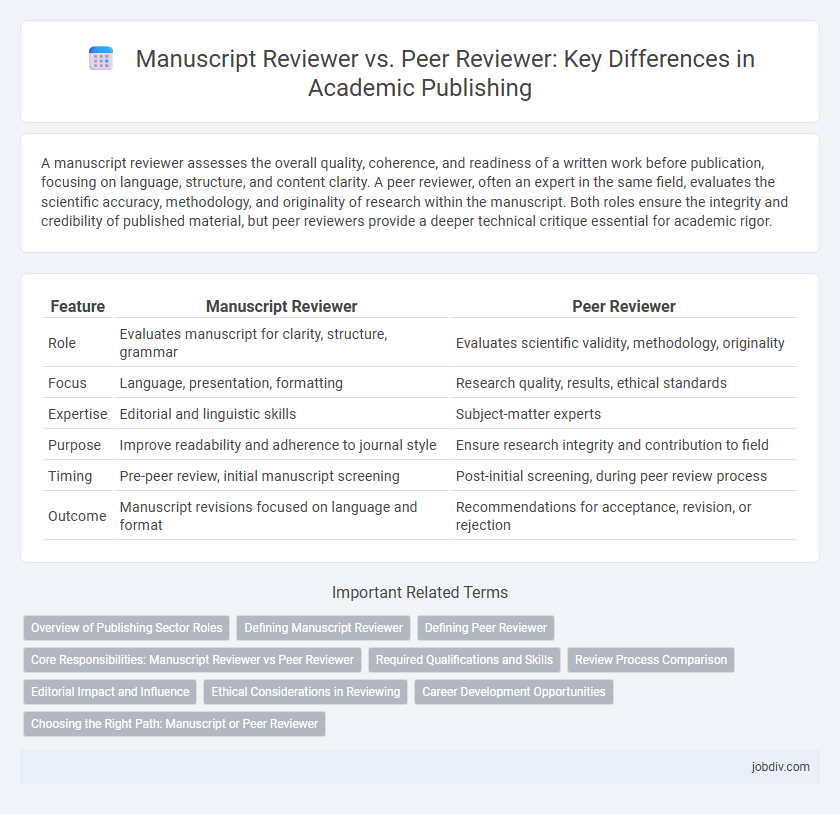A manuscript reviewer assesses the overall quality, coherence, and readiness of a written work before publication, focusing on language, structure, and content clarity. A peer reviewer, often an expert in the same field, evaluates the scientific accuracy, methodology, and originality of research within the manuscript. Both roles ensure the integrity and credibility of published material, but peer reviewers provide a deeper technical critique essential for academic rigor.
Table of Comparison
| Feature | Manuscript Reviewer | Peer Reviewer |
|---|---|---|
| Role | Evaluates manuscript for clarity, structure, grammar | Evaluates scientific validity, methodology, originality |
| Focus | Language, presentation, formatting | Research quality, results, ethical standards |
| Expertise | Editorial and linguistic skills | Subject-matter experts |
| Purpose | Improve readability and adherence to journal style | Ensure research integrity and contribution to field |
| Timing | Pre-peer review, initial manuscript screening | Post-initial screening, during peer review process |
| Outcome | Manuscript revisions focused on language and format | Recommendations for acceptance, revision, or rejection |
Overview of Publishing Sector Roles
Manuscript reviewers evaluate the originality, quality, and relevance of submitted works to ensure alignment with a journal's standards, often providing detailed feedback for authors. Peer reviewers, typically experts in the same academic or professional field, assess the validity, methodology, and contribution to the discipline, playing a critical role in upholding research integrity. Both roles are essential in the publishing sector for maintaining scholarly rigor and facilitating the dissemination of credible knowledge.
Defining Manuscript Reviewer
A Manuscript Reviewer evaluates the originality, clarity, and relevance of a submitted manuscript to ensure it meets the journal's standards and scope before publication. They provide critical feedback on the content, structure, and methodology, guiding authors to improve their work. Manuscript reviewers play a crucial role in maintaining academic quality and integrity in the publishing process.
Defining Peer Reviewer
A peer reviewer is an expert in a specific academic or scientific field who evaluates the quality, validity, and originality of a manuscript before publication to ensure it meets the standards of the journal or conference. Unlike a manuscript reviewer who may provide general feedback on structure and clarity, peer reviewers critically assess the methodology, data analysis, and relevance of findings. Peer review acts as a quality control mechanism that maintains scholarly integrity by preventing the dissemination of flawed or unsubstantiated research.
Core Responsibilities: Manuscript Reviewer vs Peer Reviewer
Manuscript reviewers primarily focus on assessing the structure, clarity, and overall presentation of a submitted manuscript to ensure it meets the journal's editorial standards. Peer reviewers evaluate the scientific validity, methodology, and originality of the research content to determine its contribution to the field. Both roles are crucial in maintaining the quality and integrity of academic publications.
Required Qualifications and Skills
Manuscript reviewers typically require strong subject-matter expertise and attention to detail to assess the clarity, coherence, and formatting of submissions, often holding academic or professional credentials relevant to the field. Peer reviewers must possess advanced knowledge in the specific research area, critical analytical skills, and the ability to evaluate the scientific rigor, methodology, and originality of the work, commonly holding doctoral-level qualifications or equivalent experience. Both roles demand integrity, impartiality, and familiarity with publishing ethics to ensure the quality and credibility of scholarly articles.
Review Process Comparison
Manuscript reviewers primarily focus on evaluating the initial submission for adherence to journal guidelines, clarity, and overall quality, while peer reviewers provide a detailed assessment of the research methodology, data analysis, and scientific rigor. The manuscript review process often includes editorial checks and scope validation before peer review, which involves subject matter experts critically examining the study's validity and contribution to the field. This distinction in roles streamlines the publication pipeline by ensuring manuscripts meet baseline standards before undergoing rigorous peer evaluation.
Editorial Impact and Influence
Manuscript reviewers primarily assess the initial quality, originality, and relevance of submissions, shaping editorial decisions early in the publishing process. Peer reviewers provide expert, specialized evaluations that validate the study's methodology and findings, enhancing the paper's credibility and scientific impact. The combined influence of both reviewers significantly elevates the editorial standards and the perceived authority of published research.
Ethical Considerations in Reviewing
Manuscript reviewers and peer reviewers both play crucial roles in academic publishing, but ethical considerations in reviewing emphasize transparency, confidentiality, and impartiality for both. Manuscript reviewers typically focus on the initial editorial scope and adherence to submission guidelines, while peer reviewers provide expert assessment of the study's scientific validity and originality. Upholding ethical standards, such as avoiding conflicts of interest and maintaining confidentiality, ensures fairness and integrity throughout the review process.
Career Development Opportunities
Manuscript reviewers gain valuable experience in critical analysis and improve their subject expertise, enhancing their academic reputation and opening doors to editorial roles. Peer reviewers benefit from networking with leading scholars and staying updated on cutting-edge research, which supports career advancement in research and academia. Both roles cultivate skills in scholarly communication, boosting prospects for tenure, grants, and leadership positions in publishing.
Choosing the Right Path: Manuscript or Peer Reviewer
Manuscript reviewers focus on evaluating the initial submission for clarity, format, and adherence to journal guidelines, ensuring the manuscript meets editorial standards before peer evaluation. Peer reviewers assess the scientific validity, methodology, and originality of the research, providing critical feedback essential for publication decisions. Choosing the right path depends on expertise and interest in editing mechanics versus in-depth content analysis within academic publishing.
Manuscript Reviewer vs Peer Reviewer Infographic

 jobdiv.com
jobdiv.com